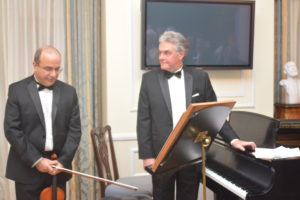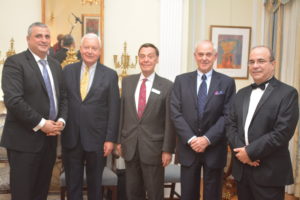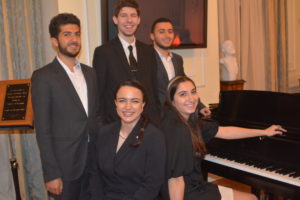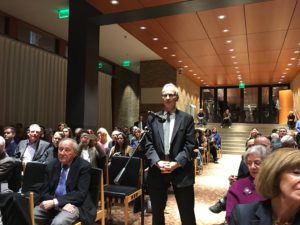.
 Moments after settling into my chair in the Auditorium at the German Embassy in Washington, I introduced myself to a seemingly distinguished lady sitting next to me. Moments earlier, we were complete strangers knowing nothing about each other besides the curiosity to learn about the documentary ‘Germans and Jews.’ But as the evening progressed I learned her name was my neighbor Naima, who was a retired professor at American University.
Just like it happened on earlier visits to the German Embassy, where I met so many strangers with whom I have developed warm friendships, I found how much we have in common – not the least of which is that ‘Naima’ is also a common name among both Jews and Muslims.
The ‘Germans and Jews’ documentary’s website states correctly so that ‘history is a memory of a
Moments after settling into my chair in the Auditorium at the German Embassy in Washington, I introduced myself to a seemingly distinguished lady sitting next to me. Moments earlier, we were complete strangers knowing nothing about each other besides the curiosity to learn about the documentary ‘Germans and Jews.’ But as the evening progressed I learned her name was my neighbor Naima, who was a retired professor at American University.
Just like it happened on earlier visits to the German Embassy, where I met so many strangers with whom I have developed warm friendships, I found how much we have in common – not the least of which is that ‘Naima’ is also a common name among both Jews and Muslims.
The ‘Germans and Jews’ documentary’s website states correctly so that ‘history is a memory of a  people.’ It communicates clearly that Europe’s fastest growing Jewish population is happening in Berlin. In doing so, the documentary also informs the viewers about the dynamics and the composition of this immigration pattern. ‘None of these developments could have been imagined in 1945,’ the website states something that is quiet accurate.
In its review, the New York Times wrote: ‘Don’t expect simple answers in “Germans & Jews.”’ Fortunately, as a viewer, I was not looking for easy answers either. I wanted to learn what the movie producers and the participants – who did not seem be to actors reading cue cards - had to say.
Tom Ciampoli notes that this film “takes a look at the drastic changes that Germany has made since the Nazi regime.” He describes it as a “conversation between friends about the effects of the Holocaust on both their own lives and the country of Germany as a whole frames this thoughtful, inclusive documentary from director Janina Quint (a German native) and executive producer Tal Recanati (who is Jewish).”
people.’ It communicates clearly that Europe’s fastest growing Jewish population is happening in Berlin. In doing so, the documentary also informs the viewers about the dynamics and the composition of this immigration pattern. ‘None of these developments could have been imagined in 1945,’ the website states something that is quiet accurate.
In its review, the New York Times wrote: ‘Don’t expect simple answers in “Germans & Jews.”’ Fortunately, as a viewer, I was not looking for easy answers either. I wanted to learn what the movie producers and the participants – who did not seem be to actors reading cue cards - had to say.
Tom Ciampoli notes that this film “takes a look at the drastic changes that Germany has made since the Nazi regime.” He describes it as a “conversation between friends about the effects of the Holocaust on both their own lives and the country of Germany as a whole frames this thoughtful, inclusive documentary from director Janina Quint (a German native) and executive producer Tal Recanati (who is Jewish).”
 The dinner time conversation between friends of different backgrounds plays prominently in the documentary. The decibel level remains steady during the conversation because no one is seen shouting or talking past each other. This allowed me as a viewer to analyze and compare what is being narrated with my own life experience and historical understanding.
This conversation instantly took me to the ‘Seder’ dinner that my friend Morris Simon invited me to this year. From that dinner, I remembered the prayers recited during that meal - in the book ‘A Passover Haggadah’: “You shall not subvert the rights of the stranger or the orphan” and “when strangers reside with you in your land you shall not wrong them … you shall love them as yourself.”
Both the conversation in the movie and the Passover prayers reminded me about the commonality between Jews and Muslims. Earlier in the day I had travelled to Baltimore for the burial of a family friend. Included in the daily prayers as well as when burying loved ones, Muslims in fact supplicate to God Almighty for blessings for the Children of Abraham while seeking His blessings for Muhammad and his followers.
As the cameras rolled through the Berlin’s Holocaust Memorial, I remembered walking there during my visit to that beautiful city that is experiencing revival as it endured both agony and glory in the past. Each landmark shown in the documentary provided a deeper understanding about the issues in both historical as well as contemporary context.
The dinner time conversation between friends of different backgrounds plays prominently in the documentary. The decibel level remains steady during the conversation because no one is seen shouting or talking past each other. This allowed me as a viewer to analyze and compare what is being narrated with my own life experience and historical understanding.
This conversation instantly took me to the ‘Seder’ dinner that my friend Morris Simon invited me to this year. From that dinner, I remembered the prayers recited during that meal - in the book ‘A Passover Haggadah’: “You shall not subvert the rights of the stranger or the orphan” and “when strangers reside with you in your land you shall not wrong them … you shall love them as yourself.”
Both the conversation in the movie and the Passover prayers reminded me about the commonality between Jews and Muslims. Earlier in the day I had travelled to Baltimore for the burial of a family friend. Included in the daily prayers as well as when burying loved ones, Muslims in fact supplicate to God Almighty for blessings for the Children of Abraham while seeking His blessings for Muhammad and his followers.
As the cameras rolled through the Berlin’s Holocaust Memorial, I remembered walking there during my visit to that beautiful city that is experiencing revival as it endured both agony and glory in the past. Each landmark shown in the documentary provided a deeper understanding about the issues in both historical as well as contemporary context.
 Talking to the filmmakers Tal Recanati and Janina Quint was a refreshing experience which showed their sincerity and objectivity in making this enlightening documentary that advances dialogue and not conspiracy theories or invectives. Being neither German nor Jew, it helped that my father has served in West Germany after World War II who shared with my his own personal observations about the death and destruction brought about by the Holocaust and World War II. In that sense, it was not just me but also my father viewing the documentary along with my newfound friend Naima and her husband.
‘Never again’ - the cry of the survivors of Auschwitz and other horrendous tragedies - rang in my ears as the rolling cameras brought fresh hopes for reconciliation. These thoughts took me to my seat in a recent concert sponsored by the Embassy Series – striving to unite people through musical diplomacy - with support from the University of Georgia Hugh Hodgson School of at the Armenian Embassy celebrating the 25th Anniversary of Armenian Independence. It then occurred to me how wonderfully this documentary can help advance dialogue between Armenia and Turkey in their complicated and tortured relationship.
Talking to the filmmakers Tal Recanati and Janina Quint was a refreshing experience which showed their sincerity and objectivity in making this enlightening documentary that advances dialogue and not conspiracy theories or invectives. Being neither German nor Jew, it helped that my father has served in West Germany after World War II who shared with my his own personal observations about the death and destruction brought about by the Holocaust and World War II. In that sense, it was not just me but also my father viewing the documentary along with my newfound friend Naima and her husband.
‘Never again’ - the cry of the survivors of Auschwitz and other horrendous tragedies - rang in my ears as the rolling cameras brought fresh hopes for reconciliation. These thoughts took me to my seat in a recent concert sponsored by the Embassy Series – striving to unite people through musical diplomacy - with support from the University of Georgia Hugh Hodgson School of at the Armenian Embassy celebrating the 25th Anniversary of Armenian Independence. It then occurred to me how wonderfully this documentary can help advance dialogue between Armenia and Turkey in their complicated and tortured relationship.The views presented in this article are the author’s own and do not necessarily represent the views of any other organization.


a global affairs media network
Reflecting on ‘Germans and Jews’

||||
December 15, 2016
 Moments after settling into my chair in the Auditorium at the German Embassy in Washington, I introduced myself to a seemingly distinguished lady sitting next to me. Moments earlier, we were complete strangers knowing nothing about each other besides the curiosity to learn about the documentary ‘Germans and Jews.’ But as the evening progressed I learned her name was my neighbor Naima, who was a retired professor at American University.
Just like it happened on earlier visits to the German Embassy, where I met so many strangers with whom I have developed warm friendships, I found how much we have in common – not the least of which is that ‘Naima’ is also a common name among both Jews and Muslims.
The ‘Germans and Jews’ documentary’s website states correctly so that ‘history is a memory of a
Moments after settling into my chair in the Auditorium at the German Embassy in Washington, I introduced myself to a seemingly distinguished lady sitting next to me. Moments earlier, we were complete strangers knowing nothing about each other besides the curiosity to learn about the documentary ‘Germans and Jews.’ But as the evening progressed I learned her name was my neighbor Naima, who was a retired professor at American University.
Just like it happened on earlier visits to the German Embassy, where I met so many strangers with whom I have developed warm friendships, I found how much we have in common – not the least of which is that ‘Naima’ is also a common name among both Jews and Muslims.
The ‘Germans and Jews’ documentary’s website states correctly so that ‘history is a memory of a  people.’ It communicates clearly that Europe’s fastest growing Jewish population is happening in Berlin. In doing so, the documentary also informs the viewers about the dynamics and the composition of this immigration pattern. ‘None of these developments could have been imagined in 1945,’ the website states something that is quiet accurate.
In its review, the New York Times wrote: ‘Don’t expect simple answers in “Germans & Jews.”’ Fortunately, as a viewer, I was not looking for easy answers either. I wanted to learn what the movie producers and the participants – who did not seem be to actors reading cue cards - had to say.
Tom Ciampoli notes that this film “takes a look at the drastic changes that Germany has made since the Nazi regime.” He describes it as a “conversation between friends about the effects of the Holocaust on both their own lives and the country of Germany as a whole frames this thoughtful, inclusive documentary from director Janina Quint (a German native) and executive producer Tal Recanati (who is Jewish).”
people.’ It communicates clearly that Europe’s fastest growing Jewish population is happening in Berlin. In doing so, the documentary also informs the viewers about the dynamics and the composition of this immigration pattern. ‘None of these developments could have been imagined in 1945,’ the website states something that is quiet accurate.
In its review, the New York Times wrote: ‘Don’t expect simple answers in “Germans & Jews.”’ Fortunately, as a viewer, I was not looking for easy answers either. I wanted to learn what the movie producers and the participants – who did not seem be to actors reading cue cards - had to say.
Tom Ciampoli notes that this film “takes a look at the drastic changes that Germany has made since the Nazi regime.” He describes it as a “conversation between friends about the effects of the Holocaust on both their own lives and the country of Germany as a whole frames this thoughtful, inclusive documentary from director Janina Quint (a German native) and executive producer Tal Recanati (who is Jewish).”
 The dinner time conversation between friends of different backgrounds plays prominently in the documentary. The decibel level remains steady during the conversation because no one is seen shouting or talking past each other. This allowed me as a viewer to analyze and compare what is being narrated with my own life experience and historical understanding.
This conversation instantly took me to the ‘Seder’ dinner that my friend Morris Simon invited me to this year. From that dinner, I remembered the prayers recited during that meal - in the book ‘A Passover Haggadah’: “You shall not subvert the rights of the stranger or the orphan” and “when strangers reside with you in your land you shall not wrong them … you shall love them as yourself.”
Both the conversation in the movie and the Passover prayers reminded me about the commonality between Jews and Muslims. Earlier in the day I had travelled to Baltimore for the burial of a family friend. Included in the daily prayers as well as when burying loved ones, Muslims in fact supplicate to God Almighty for blessings for the Children of Abraham while seeking His blessings for Muhammad and his followers.
As the cameras rolled through the Berlin’s Holocaust Memorial, I remembered walking there during my visit to that beautiful city that is experiencing revival as it endured both agony and glory in the past. Each landmark shown in the documentary provided a deeper understanding about the issues in both historical as well as contemporary context.
The dinner time conversation between friends of different backgrounds plays prominently in the documentary. The decibel level remains steady during the conversation because no one is seen shouting or talking past each other. This allowed me as a viewer to analyze and compare what is being narrated with my own life experience and historical understanding.
This conversation instantly took me to the ‘Seder’ dinner that my friend Morris Simon invited me to this year. From that dinner, I remembered the prayers recited during that meal - in the book ‘A Passover Haggadah’: “You shall not subvert the rights of the stranger or the orphan” and “when strangers reside with you in your land you shall not wrong them … you shall love them as yourself.”
Both the conversation in the movie and the Passover prayers reminded me about the commonality between Jews and Muslims. Earlier in the day I had travelled to Baltimore for the burial of a family friend. Included in the daily prayers as well as when burying loved ones, Muslims in fact supplicate to God Almighty for blessings for the Children of Abraham while seeking His blessings for Muhammad and his followers.
As the cameras rolled through the Berlin’s Holocaust Memorial, I remembered walking there during my visit to that beautiful city that is experiencing revival as it endured both agony and glory in the past. Each landmark shown in the documentary provided a deeper understanding about the issues in both historical as well as contemporary context.
 Talking to the filmmakers Tal Recanati and Janina Quint was a refreshing experience which showed their sincerity and objectivity in making this enlightening documentary that advances dialogue and not conspiracy theories or invectives. Being neither German nor Jew, it helped that my father has served in West Germany after World War II who shared with my his own personal observations about the death and destruction brought about by the Holocaust and World War II. In that sense, it was not just me but also my father viewing the documentary along with my newfound friend Naima and her husband.
‘Never again’ - the cry of the survivors of Auschwitz and other horrendous tragedies - rang in my ears as the rolling cameras brought fresh hopes for reconciliation. These thoughts took me to my seat in a recent concert sponsored by the Embassy Series – striving to unite people through musical diplomacy - with support from the University of Georgia Hugh Hodgson School of at the Armenian Embassy celebrating the 25th Anniversary of Armenian Independence. It then occurred to me how wonderfully this documentary can help advance dialogue between Armenia and Turkey in their complicated and tortured relationship.
Talking to the filmmakers Tal Recanati and Janina Quint was a refreshing experience which showed their sincerity and objectivity in making this enlightening documentary that advances dialogue and not conspiracy theories or invectives. Being neither German nor Jew, it helped that my father has served in West Germany after World War II who shared with my his own personal observations about the death and destruction brought about by the Holocaust and World War II. In that sense, it was not just me but also my father viewing the documentary along with my newfound friend Naima and her husband.
‘Never again’ - the cry of the survivors of Auschwitz and other horrendous tragedies - rang in my ears as the rolling cameras brought fresh hopes for reconciliation. These thoughts took me to my seat in a recent concert sponsored by the Embassy Series – striving to unite people through musical diplomacy - with support from the University of Georgia Hugh Hodgson School of at the Armenian Embassy celebrating the 25th Anniversary of Armenian Independence. It then occurred to me how wonderfully this documentary can help advance dialogue between Armenia and Turkey in their complicated and tortured relationship.The views presented in this article are the author’s own and do not necessarily represent the views of any other organization.


